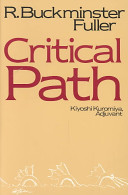The British Empire Circled the World
With the Battle of Trafalgar in 1805 the British Empire won "the world's power structures championship" and became historically the first empire "upon which," it was said, "the sun never sets." This is because it was the first empire in history to embrace the entire spherical planet Earth's 71-per¬ cent maritime, 29-percent landed, wealth-producing activities. All previous empires—Genghis Khan's, Alexander the Great's, the Romans', et al.— were unified European, North African, and Asian-continental, river-, lake-, and sea-embracing, flat-out land areas completely surrounded in all lateral directions by the infinitely unknown. All earlier empires were ininfinite systems—open systems. The British Empire was history's first spherically closed, finite system. Building and maintaining the world's most powerfrful navy, the 1805 supremely victorious British Empire was to maintain its s sovereignty over the world's oceans and seas for 113 years.
Notes:
Origin of why the "sun never sets" on this Empire.
Folksonomies: history etymology
Taxonomies:
/society/unrest and war (0.709636)
/technology and computing/operating systems (0.473980)
/science/social science/history (0.472302)
Keywords:
British Empire (0.935260 (negative:-0.026388)), British Empire Circled (0.830403 (negative:-0.413734)), flat-out land areas (0.785832 (positive:0.647998)), entire spherical planet (0.782616 (neutral:0.000000)), 71-per¬ cent maritime (0.782554 (neutral:0.000000)), power structures championship (0.782033 (neutral:0.000000)), previous empires—Genghis Khan (0.768213 (neutral:0.000000)), victorious British Empire (0.744683 (positive:0.387346)), World Origin (0.616417 (negative:-0.413734)), earlier empires (0.614620 (neutral:0.000000)), lateral directions (0.604250 (positive:0.647998)), wealth-producing activities (0.599805 (neutral:0.000000)), et al.— (0.597703 (neutral:0.000000)), sun (0.475453 (negative:-0.353010)), history (0.467420 (neutral:0.000000)), Trafalgar (0.457255 (neutral:0.000000)), sovereignty (0.446715 (positive:0.387346)), Romans (0.446189 (neutral:0.000000)), seas (0.442344 (positive:0.387346)), oceans (0.440794 (positive:0.387346)), Battle (0.436876 (neutral:0.000000)), navy (0.436427 (positive:0.325278)), Earth (0.435122 (neutral:0.000000)), Alexander (0.434213 (positive:0.514667)), Great (0.434169 (positive:0.514667))
Entities:
British Empire:Organization (0.898218 (neutral:0.000000)), Trafalgar:City (0.246135 (neutral:0.000000)), Khan:Person (0.172456 (neutral:0.000000)), 29-percent:Quantity (0.172456 (neutral:0.000000)), 113 years:Quantity (0.172456 (neutral:0.000000))
Concepts:
British Empire (0.989020): dbpedia | freebase
Earth (0.787119): dbpedia | freebase
Napoleonic Wars (0.762288): dbpedia | freebase | yago
First French Empire (0.745098): dbpedia | freebase | yago
United Kingdom (0.701666): geo | website | dbpedia | ciaFactbook | freebase | opencyc | yago
Empire (0.607914): dbpedia | freebase | opencyc
Imperialism (0.598282): dbpedia | freebase | opencyc
Colonialism (0.580979): dbpedia | freebase | opencyc





